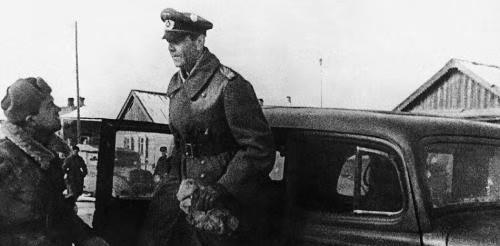Paulus was not incompetent, he simply held the wrong position. He was a very good staff officer, but he mistakenly served as the chief officer of the unit.
Later, the Sixth Army was annihilated at Stalingrad, and Paulus, who was then the commander of the Sixth Army, became the object of criticism. But it was his appointees, however, who bore more responsibility, hitler, who caused the tragedy by giving Paulus a position beyond his reach.

We can see from Paulus's resume that he served as a junior officer in the army and, in World War II, as chief of staff of the army group. He later served as Deputy Chief of the General Staff of the German Army. He was responsible for drawing up the battle plan against the Soviet Union, the Barbarossa plan, which was a great success in the early stages of the war.
By January 1942, on the recommendation of Reichenau, commander of Army Group South, Paulus took over as commander of the German 6th Army. The 6th Army was germany's most elite army group, with a large organization, rich combat experience and strong combat effectiveness. It was the main assault force in Germany.
In May 1942, Paulus commanded his troops to victory in the Battle of Kharkov. Next, he participated in the Battle of Stalingrad. At the beginning of the campaign, the German army was progressing relatively smoothly. However, in the urban street battles, they suffered great losses and reached an impasse.
By November, the Soviets had mobilized heavy reinforcements to launch a counteroffensive against Paulus's forces. After a pincer offensive, the Soviets surrounded the main force of Paulus's 6th Army under the city of Stalingrad.
Paulus led the 6th Army until January 1943, when it ran out of ammunition and had to surrender to the Soviets.
We can see that Paulus was good at military planning, and in his staff post, he was very successful and made outstanding achievements. When he was the commander of the 6th Army, he could command the downwind battle according to the battle plan, and he could command more smoothly. However, as soon as it was time to deal with the situation, he exposed the problem of hesitation, which had a disastrous impact on the war situation and the troops.
Paulus had at least three chances to save him and his troops. However, due to his hesitation, he gave up easily.
For the first time, it was his troops that had just been surrounded. At this time, if he organized his troops to break through immediately, the situation behind him would be much better. But to do so, to abandon the occupied Stalingrad region, Hitler opposed it, and Paulus gave up.
The second time, it was Manstein's relief forces that reached 40 kilometers from Stalingrad. Manstein demanded that Paulus break out in opposite directions, and Paulus again rejected Manstein's proposal and gave up the opportunity.
The third time, it was the Soviets who demanded that Paulus surrender and gave him generous treatment. Due to Hitler's opposition, Paulus gave up his last chance.
It was Paulus's lack of maneuverability as a unit commander that brought disaster to him and his troops.
Examples like Paulus's are not only foreign, but also in Chinese history. During the Battle of Huaihai, the commander of the Kuomintang corps, Huang Wei, was also a man like Paulus, and finally brought his corps into the encirclement of the People's Liberation Army, was completely annihilated by the People's Liberation Army, and Huang Wei was also taken prisoner.